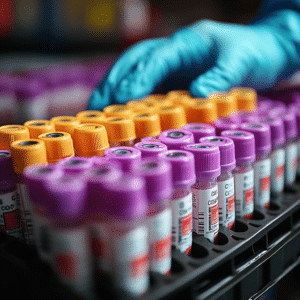
Understanding Lexapro Withdrawal and Its Impact
Lexapro, generically known as escitalopram, is a widely used selective serotonin reuptake inhibitor (SSRI) that helps manage anxiety and depression. It plays a crucial role in balancing chemicals in the brain, providing relief to those who struggle with their mental health. However, stopping Lexapro isn’t always smooth sailing. The brain needs time to readjust after discontinuation, leading to a range of withdrawal symptoms that can feel overwhelming and upsetting.
Research shows that many individuals experience a rollercoaster of feelings when they decide to cease taking Lexapro, making the process akin to negotiating a foggy road rife with potholes. The withdrawal timeline varies from person to person, but symptoms typically start within a few days after stopping the medication. By understanding this process, family members can become better companions in their loved ones’ journeys through Lexapro withdrawal.
For some, this journey of withdrawal leads to worsening anxiety and depression, which many initially aimed to alleviate through treatment. It’s essential for parents and caregivers to note these patterns, as they can help identify when a loved one is in distress and provide much-needed support.

The 7 Dark Symptoms of Lexapro Withdrawal
Experiencing Lexapro withdrawal can feel like a foggy day where visibility is poor. Here are the seven prevalent symptoms individuals may face during this challenging experience:
Ironically, the very drug meant to alleviate anxiety often triggers heightened nervousness when it’s stopped. Individuals may find themselves caught in a cycle of panic attacks, spiraling back into anxiety that feels even more significant than before. Studies reveal that nearly half of those who stop taking SSRIs will face intensified feelings of anxiety.
How frustrating it can be to find oneself grappling with those deep feelings of sadness again! Many individuals experience a resurgence of depressive symptoms when withdrawing from Lexapro. Those who suddenly discontinue their medication without a tapering plan often find themselves in emotional turmoil, battling the very demons they once sought to escape.
Sleep issues can also rear their ugly heads during withdrawal. Many report having trouble either falling asleep or staying asleep, creating a vicious cycle of fatigue that can heighten emotional distress. Sleep disturbances have further been linked to long-range psychological effects, exacerbating the overall healing journey.
The physical side of withdrawal can include dizziness and flu-like symptoms. These can further complicate one’s experience and cloud the path to clarity. Many can mistake these physical feelings for other illnesses, leading to added stress when trying to manage both physical and mental tasks.
“Brain fog” is a term frequently used during withdrawal, and a fitting one at that! Patients often struggle with memory and concentration. This can impact work life and daily responsibilities, leaving those going through withdrawal feeling frustrated and powerless in their ability to perform.
Emotional sensitivity often heightens during this time. Those experiencing Lexapro withdrawal may find themselves feeling irritable and reactive, leading to tension in personal relationships. This unpredictability often creates an additional layer of stress for both parents and children navigating these turbulent waters.
Some may experience bizarre sensations commonly referred to as “brain zaps,” a jarring feeling akin to electric shocks in the brain. While these sensations are not physically harmful, they can feel distressing and contribute to the overall burden of withdrawal.
A Personal Perspective from Sandy at 7410 S Creek Rd Suite 100
Sandy, a resident at 7410 S Creek Rd Suite 100, bravely shares her story about her experience with Lexapro withdrawal. After five years of daily use, she decided to stop her medication. Sandy recognized the danger of an abrupt cessation and sought to taper down slowly, learning quickly how vital this decision was to navigating her symptoms. The slow process allowed Sandy to manage her withdrawal effects better, finding relief through local resources and supportive communities.
During her journey, Sandy attended several support groups and therapy sessions that provided her a haven amidst the storm of emotions swirling around her. Through her connection with others in similar situations, she found validation and comfort. Her story is a testament to the strength gained through community support and shared experiences.
Through Sandy’s journey, it becomes clear that support from friends, family, and groups plays an enormous role in finding balance again. Parents who understand these tumultuous waves can offer a lifeline to their children facing their unique battles with addiction or withdrawal.
Insights from Turlock: Embracing Community Support
In Turlock, CA, at 4918 Taylor Court, community support thrives as an essential lifeline for those withdrawing from anxiety medications. Local therapy groups and peer-support networks have become vital for folks like Marcus. He found comfort and understanding by sharing experiences and discussing approaches to overcoming the hurdles of Lexapro withdrawal.
These communal discussions often shed light on practical strategies and coping mechanisms. Participants help each other discover new ways to handle anxiety and depression while forming genuine connections to alleviate the sense of isolation often felt during withdrawal. Community support serves as a bridge for recovery, allowing individuals to realize they are not alone in their struggles.
Families can leverage these community resources, too. By participating in local support groups or therapy sessions, they can better understand the challenges their loved ones face, providing a firmer foundation for recovery.
Navigating Educational and Support Resources: The Book of Texas Scholarships and Grants 2025
Educational resources form a significant part of healing during the recovery journey. The “Book of Texas Scholarships and Grants 2025” serves as a financial guide while emphasizing mental health resources available for families tackling addiction and withdrawal crises.
Understanding available financial aid can help relieve monetary burdens, allowing individuals to focus more on mental and physical well-being rather than financial struggles. The book highlights scholarships and scholarships specifically catered to students, parents, and families who seek assistance during these trying times.
Parents are encouraged to sift through these resources and familiarize themselves with local mental health programs. Creating a broad net of support is crucial when navigating the heavy weight of Lexapro withdrawal.
Rehabs to Consider for Those Struggling: Best Rehabs in 2025
As recovery can be a steep uphill climb, finding reputable rehabilitation facilities becomes central to successfully managing overwhelming withdrawal symptoms. The best rehabs in 2025, such as Serenity at Summit in New Jersey and The Meadows in Arizona, offer specialized support for individuals grappling with substance dependency, including transition from SSRIs like Lexapro.
Facilities like Serenity at Summit provide tailored therapeutic programs that focus on holistic healing. They combine traditional therapies with innovative activities designed to support mental health recovery, affording individuals a safe space from which to navigate the complexities of withdrawal.
Parents should identify and consider these facilities when the struggle becomes too great. Recognizing when to seek professional support can mean the difference between extended suffering and a fresh start for individuals facing addiction and withdrawal.
The Comprehensive Approach: The 8-Hour Safe Comprehensive 2025 Originator
Managing the symptoms of Lexapro withdrawal often requires a comprehensive approach. The 8-Hour Safe Comprehensive 2025 Originator program integrates various therapies and methods designed to guide individuals through their journey effectively.
Combining traditional therapies with holistic, experiential options can provide patients with tools to manage their symptoms. This program emphasizes support, education, and personal agency, empowering individuals as they navigate their healing process.
Incorporating alternative methods—such as mindfulness, meditation, and group therapy—allows individuals to tailor their recovery process. Feeling equipped with a diverse set of coping strategies can enhance individual outcomes significantly.
Reflecting on the Journey Ahead
The recovery path from Lexapro withdrawal is often a winding road fraught with ups and downs. It calls for unyielding patience, time, and the right kind of support. By fostering community connections, utilizing available resources, and embracing a holistic view of mental health, individuals can make it through the dark symptoms of withdrawal.
Parents, your involvement and understanding can provide a beacon of hope. Each step taken in support and communication strengthens the foundation for recovery from addiction. As we continue to address the unique challenges of withdrawal, let’s remember—recovery is possible. The light at the end of the tunnel is within reach for everyone navigating these turbulent waters.
Lexapro Withdrawal: Fun Trivia and Interesting Facts
Understanding Lexapro Withdrawal
Lexapro, or escitalopram, is commonly prescribed for depression and anxiety, but withdrawing from it can feel like a rollercoaster ride. Around 20% of those who suddenly stop taking Lexapro report withdrawal symptoms. It’s a journey filled with ups and downs. Interestingly enough, while treating anxiety might be a priority, many people find themselves navigating the struggles of withdrawal instead. This experience can sometimes be accompanied by anticipatory grief, where individuals mourn the loss of who they once were while on medication.
Trivia to Lighten the Mood
Did you know that mental health journeys often parallel the experience of many other challenges in life? For example, just like hitting that perfect swing in breezy golf, getting off Lexapro takes a precise and steady approach. Moreover, some resources offer helpful tools, such as stop smoking aids which could assist those who also struggle with addiction issues during their recovery. It’s fascinating how various aspects of health interconnect, showing that seeking change often involves multiple strategies.
Insights and Pop Culture
Another fun tidbit? Celebrities often share their own battles with mental health, creating a sense of community for those fighting similar battles. It’s like tuning into debates about if Kamala Harris will be on Joe rogan—everyone( has an opinion! Remembering that you’re not alone can uplift spirits during tough times. Speaking of uplifting, as you pursue recovery, staying informed about things that matter to you can help keep your mind engaged. Consider exploring new Movies to find joy and inspiration along your lexapro withdrawal journey.





























